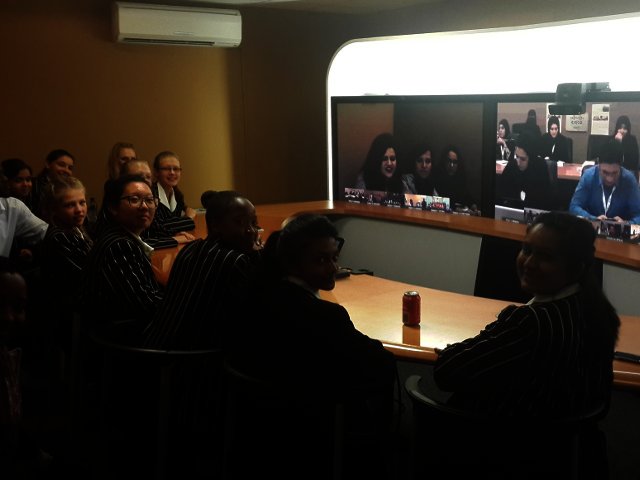By participating in International Girls in ICT Day, Cisco South Africa is inspiring young women to create technologies that can change the world.
Julia Maredi grew up in Limpopo with her two brothers and two sisters. After her father passed away when she was seven, her mother, who was a domestic worker, struggled to make ends meet. The plan was to study after completing Matric so that she could help her mother, but the family could not afford further education. After completing school, Julia moved to Johannesburg and got a job as a cleaner. Her path crossed with that of Thabo Sedibe from TCM Academy, which provides training in ICTs to previously disadvantaged youths. Thabo encouraged Julia to study ICT; she took his advice and later became the top student at the Academy, developing skills in IT essentials, CCNA and CCNA security.
Dimakatso Mokgotho, another TCM student selected for the Cisco programme, excelled at maths in school and even solved maths problems when she was bored. She grew up in Lebowakgomo, near Limpopo, with her mother and sister, and later studied IT essentials, CCNA and system support at TCM Academy.
Both girls attended International Girls in ICT Day at Cisco South Africa in 2014, where they were given the opportunity to meet Tebelelo Seretse, Ambassador of Botswana, and to speak to female Cisco professionals about their experiences in the industry.
“The day was educational. It not only expanded our knowledge in ICT but also promoted positive thinking and realistic expectations about the IT world,” says Julia. “Ambassador Tebelelo Seretse encouraged us not to be afraid of being in IT and not to give up when faced with challenges.”
“I learned survival skills and how to handle day-to-day challenges that most women experience in a male-dominated environment,” says Dimakatso. “I was inspired by all the women at Cisco and learned a lot from their experiences, especially that professionalism and hard work gives you an advantage and keeps you a step ahead.”
Cisco commits to girls’ empowerment
This is the fourth year that Cisco South Africa has taken part in the annual Girls in ICT Day initiative. Each year, 25 girls between the ages of 15 and 20 (Grades 9 to 12) are invited to spend the day at Cisco’s offices in Johannesburg. Girls are selected from partner schools, including Jeppe Girls, Athlone Girls and TCM Academy. Throughout the day, the girls gain first-hand experience of what life is like in an IT environment, while meeting and talking to some of Cisco’s successful senior female staff members about the challenges and rewards of working in a typically male-dominated industry.
The day includes talks by junior and female staff members and ‘power sessions’ during which the girls can ask questions and deepen their understanding of the industry. The day ends with a TelePresence session, connecting the South African office with other participating Cisco sites around the world, including Nigeria, Senegal, Kenya, Morocco, Egypt, the UK and Russia.
Tech needs girls
UN Women recently reported on diversity figures from major tech companies globally. They found that the technology space is still heavily male-dominated, with women filling less than 20% of tech jobs. The problem with this, says Alfie Hamid, regional manager of Cisco Corporate Affairs for sub-Saharan Africa, is that existing and emerging technology is being developed from only one perspective – that of men. “By getting more females into IT, we will have a more balanced perspective. We need another point of view of how technology should be designed and used, and how it can be beneficial to society,” says Hamid.
He gives the example of technology that is used exclusively by women, such as that which monitors pregnancies. “I can walk into any pharmacy and pick up an inexpensive blood sugar or blood pressure monitor. This technology is affordable and accessible because these conditions affect both men and women,” says Hamid. “But there are very limited options when it comes to pregnancy and baby-monitoring technology. There is no device that can be purchased off the shelf and taken into rural areas, for example, even though this could have a huge impact on infant mortality. When we look at technology from a female perspective, we find a significant gap in the market. If there were more females in the medical technology industry, we might already have a gadget like that. Women have a critical role to play in technology, and their contributions could offer enormous benefits to society.”
Julia now works as a junior IT technician and admin call dispatcher at TCM for Standard Bank. She is working towards her goal of becoming a network administrator and hopes to one day start her own company to help youths find jobs. “The ICT sector is a key source of growth for women and for South Africa’s economy,” she says. “Initiatives like International Girls in ICT Day give women the confidence to pursue careers in ICT.”
Dimakatso is a customer engineer and call dispatcher for TCM-Standard Bank. She hopes to one day work for one of Cisco’s international offices and is always open to new experiences. “I would definitely encourage young women to take part in International Girls in ICT Day,” she says. “It is an overwhelming and motivating experience that I feel should be exposed to a lot of young women in all kinds of departments – not only in ICT.”
More than 80 Cisco offices are participating in International Girls in ICT Day this year, impacting more than 3 000 girls in 50 countries.





